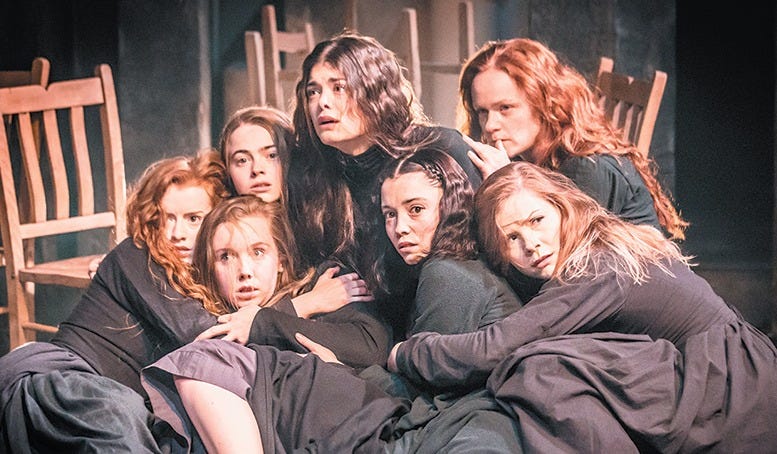For the entirety of summer, Love Island USA has been shaking the world with its sixth season, which features all the greatest elements of a successful reality show—pot-stirring challenges! New twists! Betrayal! Tearful resolution! Perfect women being thrown into a villa with some of the worst men you’ve ever seen in your life!
From June 11 to July 21, I was locked into this show like was my job. The series, which spanned a 36-episode run of near-daily hourlong installments, was impossible to look away from. Every episode was packed to the brim with drama and like a sedative to the brain. Who among us will ever forget the moment Kenny Rodriguez broke down crying from heartbreak? What about when it was revealed on social media that “bombshell” contestant Daia McGhee might have been courting season winner Kordell Beckham because of his elder brother, NFL star Odell Beckham Jr.? Perhaps most importantly, we will cherish the friendship between the women in the villa—particularly between season winner Serena Page, JaNa Craig and Leah Kateb—that gave the show such a sweet touch of platonic love amidst the ups and downs of couplings and recouplings.
But the most pivotal moment of the season was when bombshell Andrea Carmona was voted off the island by her peers just days after her entrance. It was a plot arc that spurred days of arguments and ignited discourse among the millions watching at home. In fact, it was such a dramatic moment that during the August 16 cast reunion episode, the producers took nearly twenty percent of the entire reunion just to revisit the night and air the full, uncut voting process.

“When I came out of the villa, I was getting attacked saying I was a mean girl,” Carmona tearfully said during the reunion, as cast member Liv Walker chimed in to say, “But watching the show back, you made snarly comments many times.”
The accusations of mean girl behavior have been bandied about this year like no other, with fans calling everyone from Carmona to Kateb, Craig, Page and Walker “mean girls” at different points for comments or expressions they made on screen. And it’s not the first time we’ve seen this by our digital watering hole. Amidst the public reception over Sabrina Carpenter’s newest album, Short n’ Sweet, in which she allegedly speaks about her situationship with Shawn Mendes in between his breakups with Camila Cabello, some have taken to TikTok to accuse her of “not being a girl’s girl.” And back in March, on Neflix’s Love is Blind USA reunion episode, the women of the show threw the comment back and forth at each other like a hot potato, indicting each other with behaving like a “pick-me girl” and not a “girl’s girl” at various points throughout the season.
“You should relax calling someone a clown when you told him shit about me [sic] the entire time, saying that I’m a pick-me girl? You’re the pick-me girl,” season villain Sarah Ann Bick yelled at cast member Laura Dadisman as they rehashed the memory of Dadisman’s fiancé leaving her for Bick. And just as castmate Jessica Vestal came to Dadisman’s defense, telling Bick, “you’re the pick-me girl,” Bick sniped back, “You’re the pick-me girl—don’t start!”

The idea of the mean girl has long been cemented into our popular lexicon, but the concept of a pick-me was revitalized on social media in 2022, when straight women began to make fun of other straight women who eschew traditionally “feminine” interests for “masculine” ones in order to appeal to men. It’s inherently the opposite of what we understand as a “girl’s girl”—the kind of woman who sticks by her sisterhood no matter what. And while it’s easy to relegate these phrases to the contrived world of reality television, their impact is much wider. The term “girls’ girl” exploded on Google Search from August 4 to August 10, just a week before the Love Island USA reunion. The term “pick-me girl” soared in Google searches during the week of the Love is Blind USA reunion this year, 100 times the frequency of searches in 2019.
A pick-me girl can be characterized by any number of markers: having few girlfriends, playing video games, dubbing oneself as “wifey material.” Meanwhile, a girl’s girl has been identified as a similarly infinite number of traits: defending other women in public, taking care of your friends, unapologetically loving feminine-coded things like pink and sugary drinks. Many of these characteristics are a direct response to the “not like the other girls” meme of the 2010s, as well as the sanitized feminism that trickled down through the #GirlBoss era. If you talk badly about another woman, you’re not a girl’s girl. If you make another woman feel badly about herself, you’re not a girl’s girl. If you take the side of a man, you have no sense of solidarity, which is inherently the opposite of a girl’s girl ethos.
It’s useful terminology. Many of us women have experienced betrayal at the hands of other women you thought to be your friends. Many of us have argued and lost women in our lives to something as silly as a boy. We’ve been degraded and belittled by other women in professional settings, or felt alone in a group of women because their values so clearly diverged from ours. It’s a heartbreak that stings more than any other kind. Pick-me girls are so exhausting to deal with because you know they are actively defending a system that will never protect her the same way. And it’s frustrating to feel the blunt of her shame and punishment simply because she operates under some false impression that she can win over the affections of a world that is oppressing her.
But while the intentions of the term may have started in love, now, women now use these accusations against each other like some kind of modern-day stoning. You can see it in the way these reality stars throw the term at each other like they are brandishing irons, the way people on social media lob it onto these stars like Caesar decreeing the dealth penalty. The crimes range from stealing another’s man to giving an offhanded glance one time, but the damnation is the same. And it doesn’t really matter if the women learned from their mistakes, or if there was more to footage aired, or if they acted out of character. “Witchery’s a hanging error,” as Mary Warren cries in The Crucible.
Mean girlism’s a hanging error. Burn her at the stake.

It’s a cutting and effective punishment. After all, no one wants to be seen as a bully or the girl begging at the feet of men for their approval. The undertones imply that your behavior is embarrassing, backstabbing, and anti-feminist. But the problem with the way “girl’s girl” is weaponized now is very much that it doesn’t allow for any space for continuation. It is an all-encompassing moral fork: either you are a bad woman, or you are a good one, and that’s that. The term “pick-me” was meant to be used for privileged women who have exercised their privilege by contributing to the pain of other women. But as I watched these reality stars lob the term “pick-me” at each other in their Sherry Hill prom gowns on hastily-constructed film sets this year, I failed to see how any of this vocabulary was doing any good for us.
See: Having anti-trans views is truly pick-me behavior, because you just hate women. Giving another girl a cold glance because she’s crying again shouldn’t warrant community exile. It just means you’re a little catty. And who among us…?
Moreover, the idea of what makes a “girl’s girl” or a “pick-me” is entirely based in external imagery rather than internal value—a byproduct of feminism online, no doubt. This is what has happened to many theories on social media: they are positioned as more of a performance than a process, by virtue of being presented as a flickering image on a screen before you are given the chance to sit and digest the idea. What this ultimately does is emphasize the importance of appearing like a girl’s girl rather than being one, which many industries attempt to do when they market their products as some experience of girlhood while simultaneously exercising gross amounts of capitalistic power.
The reality is, women make mistakes, feel anger, lash out when they don’t know how else to articulate their beliefs, and are already penalized by the world for it. It doesn’t do anything for them when they are then also afraid of being shunned by other women for making said mistakes. To fixate on how your face looks around other women instead of practicing solidarity with the most marginalized of communities is not liberating anyone. And placing one blanket punishment for a myriad of behaviors is as nearsighted as it is self-flagellating. What does the witch hunt for women’s wrongs do besides put more blame on women?
I don’t like it any more than you do, because I simply do not vibe with all women—some of you bitches are very dumb. But once your politics is hinged upon being correct more so than being loving, you will never achieve the collective goal you so desire.
“Some people will come to a coalition and they rate the success of the coalition on whether or not they feel good when they get there,” the late feminist scholar Bernice Johnson Reagon famously said. “They’re not looking for a coalition; they’re looking for a home. They’re looking for a bottle with some milk in it and a nipple.”
Girlhood has lured us into some illusion that true feminism is liking all women, but that’s simply not true. Solidarity, particularly non-colonial solidarity, is a regimented practice. Not everyone will be your home in the process. And frankly, it is a waste of time to shame someone for not being your home, rather than work on a world in which you can build a safe one. Let the criticism fit the crime. You can hate them and still acknowledge that their dick-sucking worldview is a fault of the dick, not their mouth. Isn’t it a better use of energy to just castrate the dick?



THIS will be in the US history books